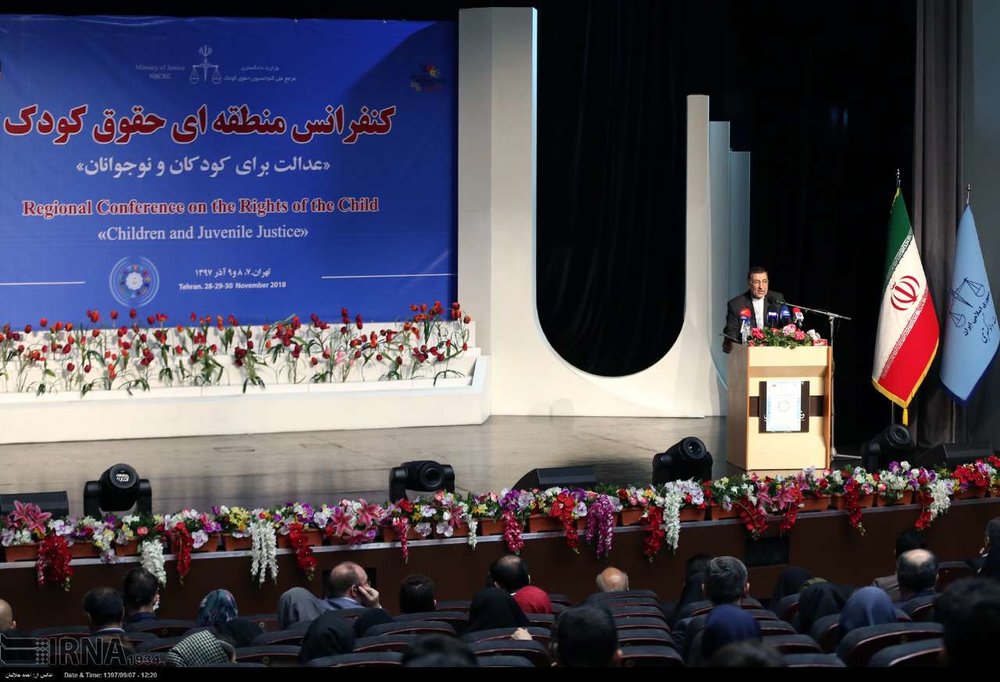Asserting children’s right requires govt. legal support: minister

TEHRAN — In order to establish children’s right, the government should come out in support for it, Justice Minister Alireza Avaie has said.
Avaie made the remarks over Regional Conference on Rights of the Child, opening on Wednesday in Tehran, IRNA news agency reported.
The 22-million children constituting 30 percent of the country’s total population need legal support from the government, Avaie said, adding that while parents are legal guardians of the children in order for children to enjoy their rights the government should stand up for them.
In the Islamic Republic of Iran refugee children or foster and adopted children are all the same regarding their rights and families as well as the government should strive to grant them their right, he added.
The minister went on to say that granting citizenship to children born to Iranian mothers and foreign fathers, supporting orphans and children with dysfunctional families, approving law on children’s right, and reforming the law on marriageable age are some of the social and legal measures taken in support for children’s right.
Convention on the Rights of the Child
The United Nations Convention on the Rights of the Child (commonly abbreviated as the CRC or UNCRC) is a human rights treaty which sets out the civil, political, economic, social, health and cultural rights of children. The Convention defines a child as any human being under the age of eighteen, unless the age of majority is attained earlier under national legislation.
The UN General Assembly adopted the Convention and opened it for signature on 20 November 1989 (the 30th anniversary of its Declaration of the Rights of the Child). It came into force on 2 September 1990, after it was ratified by the required number of nations. Currently, 196 countries are party to it, including every member of the United Nations except the United States.
The Convention on the Rights of the Child is the most rapidly and widely ratified international human rights treaty in history.
The Convention changed the way children are viewed and treated – i.e., as human beings with a distinct set of rights instead of as passive objects of care and charity.
The unprecedented acceptance of the Convention clearly shows a wide global commitment to advancing children’s rights.
Iran has adhered to the convention since 1991 and ratified it in the Parliament in 1994. Iran has also signed the both optional protocols which relate to the special protection of children against involvement in armed conflict and the sale of children and sexual exploitation.
Regional Conference on Rights of the Child
The Regional Conference on Rights of the Child under the theme of “Justice for Juvenile and Children” will culminate on Friday. The opening ceremony was attended by Iranian vice president for women's and family affairs, Masoumeh Ebtekar, Minister of Sports and Youth Affairs Masoud Soltanifar, Prof. Philip D. Jaffé a member of UN Committee on the Rights of the Child, and UNICEF Representative in Iran Will Parks.
The conference aims to highlights the achievements of Iran on children’s right and set the scene for knowledge exchange between experts on children’s rights.
30 of judges, representatives and experts on children’s right from Russia, Lebanon, Afghanistan, Pakistan, Kazakhstan, Azerbaijan, Switzerland, Palestine and Jordan have taken part in the conference.
The conference is co-organized by vice presidency for women's and family affairs, Ministry of Sports and Youth Affairs, and Foreign Ministry.
MQ/MG
Leave a Comment